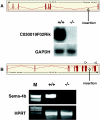High-throughput trapping of secretory pathway genes in mouse embryonic stem cells
- PMID: 16478711
- PMCID: PMC1369290
- DOI: 10.1093/nar/gnj026
High-throughput trapping of secretory pathway genes in mouse embryonic stem cells
Abstract
High-throughput gene trapping is a random approach for inducing insertional mutations across the mouse genome. This approach uses gene trap vectors that simultaneously inactivate and report the expression of the trapped gene at the insertion site, and provide a DNA tag for the rapid identification of the disrupted gene. Gene trapping has been used by both public and private institutions to produce libraries of embryonic stem (ES) cells harboring mutations in single genes. Presently, approximately 66% of the protein coding genes in the mouse genome have been disrupted by gene trap insertions. Among these, however, genes encoding signal peptides or transmembrane domains (secretory genes) are underrepresented because they are not susceptible to conventional trapping methods. Here, we describe a high-throughput gene trapping strategy that effectively targets secretory genes. We used this strategy to assemble a library of ES cells harboring mutations in 716 unique secretory genes, of which 61% were not trapped by conventional trapping, indicating that the two strategies are complementary. The trapped ES cell lines, which can be ordered from the International Gene Trap Consortium (http://www.genetrap.org), are freely available to the scientific community.
Figures







Similar articles
-
Suppression of nonsense-mediated mRNA decay permits unbiased gene trapping in mouse embryonic stem cells.Nucleic Acids Res. 2005 Feb 1;33(2):e20. doi: 10.1093/nar/gni022. Nucleic Acids Res. 2005. PMID: 15687378 Free PMC article.
-
Genomewide production of multipurpose alleles for the functional analysis of the mouse genome.Proc Natl Acad Sci U S A. 2005 May 17;102(20):7221-6. doi: 10.1073/pnas.0502273102. Epub 2005 May 3. Proc Natl Acad Sci U S A. 2005. PMID: 15870191 Free PMC article.
-
Gene-trap vectors and mutagenesis.Methods Mol Biol. 2009;530:29-47. doi: 10.1007/978-1-59745-471-1_3. Methods Mol Biol. 2009. PMID: 19266330
-
The gene trap resource: a treasure trove for hemopoiesis research.Exp Hematol. 2005 Aug;33(8):845-56. doi: 10.1016/j.exphem.2005.03.016. Exp Hematol. 2005. PMID: 16038776 Review.
-
A review of current large-scale mouse knockout efforts.Genesis. 2010 Feb;48(2):73-85. doi: 10.1002/dvg.20594. Genesis. 2010. PMID: 20095055 Review.
Cited by
-
Mutant non-coding RNA resource in mouse embryonic stem cells.Dis Model Mech. 2021 Feb 5;14(2):dmm047803. doi: 10.1242/dmm.047803. Dis Model Mech. 2021. PMID: 33729986 Free PMC article.
-
Gene trap mutagenesis in the mouse.Methods Enzymol. 2010;477:243-69. doi: 10.1016/S0076-6879(10)77013-0. Methods Enzymol. 2010. PMID: 20699145 Free PMC article.
-
Gene-trapped mouse embryonic stem cell-derived cardiac myocytes and human genetics implicate AKAP10 in heart rhythm regulation.Proc Natl Acad Sci U S A. 2007 May 15;104(20):8461-6. doi: 10.1073/pnas.0610393104. Epub 2007 May 7. Proc Natl Acad Sci U S A. 2007. PMID: 17485678 Free PMC article.
-
Modeling insertional mutagenesis using gene length and expression in murine embryonic stem cells.PLoS One. 2007 Jul 18;2(7):e617. doi: 10.1371/journal.pone.0000617. PLoS One. 2007. PMID: 17637833 Free PMC article.
-
ERO1-beta, a pancreas-specific disulfide oxidase, promotes insulin biogenesis and glucose homeostasis.J Cell Biol. 2010 Mar 22;188(6):821-32. doi: 10.1083/jcb.200911086. J Cell Biol. 2010. PMID: 20308425 Free PMC article.
References
-
- Stanford W.L., Cohn J.B., Cordes S.P. Gene-trap mutagenesis: past, present and beyond. Nature Rev. Genet. 2001;2:756–768. - PubMed
-
- Zambrowicz B.P., Abuin A., Ramirez-Solis R., Richter L.J., Piggott J., BeltrandelRio H., Buxton E.C., Edwards J., Finch R.A., Friddle C.J., et al. Wnk1 kinase deficiency lowers blood pressure in mice: A gene-trap screen to identify potential targets for therapeutic intervention. Proc. Natl Acad. Sci. USA. 2003;100:14109–14114. - PMC - PubMed
-
- Wiles M.V., Vauti F., Otte J., Fuchtbauer E.M., Ruiz P., Fuchtbauer A., Arnold H.H., Lehrach H., Metz T., von Melchner H., et al. Establishment of a gene-trap sequence tag library to generate mutant mice from embryonic stem cells. Nature Genet. 2000;24:13–14. - PubMed
Publication types
MeSH terms
Substances
LinkOut - more resources
Full Text Sources
Other Literature Sources
Medical
Molecular Biology Databases

